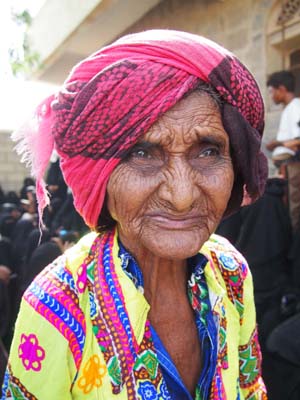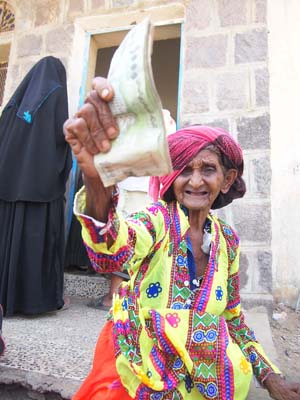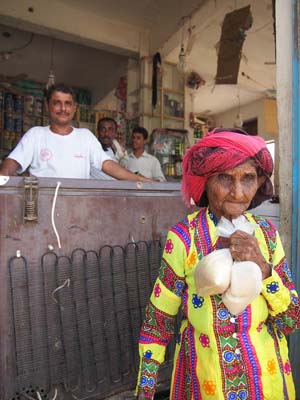
Today marks World Food Day. But millions of people in Yemen don't have enough food to eat; and five million people are severely food insecure, needing emergency assistance.
Aisha tells me she's 100 years old and things have never been so bad. Deep lines etch her weathered face and I can only imagine the harsh life she must have led.
I find her sitting on some steps in the crowded grounds of a school in Bayt al-Faqih district, Al Hodeidah governorate, western Yemen, where Oxfam is carrying out its cash distribution program, giving a cash lifeline to some of the poorest and most vulnerable families during the current hunger crisis.

Aisha instantly caught my eye. She immediately stood out from the crowd of mostly black-clad women in black headscarves and abayas, a loose cloak-like tunic covering the whole body. Tiny and frail, she was brightly dressed in a beautifully colored yellow, pink and blue tunic dress and pink and black headscarf.
About half of Yemen's population don't have enough to eat; and around five million people, like Aisha, are severely food insecure, skipping meals because they don't have the money to purchase food for the family and needing emergency assistance.
Oxfam has been helping more than 100,000 people in Bayt al-Faqih with cash payments. It allows them to purchase items that cover their most basic needs during the hunger gap season. It allows some of the poorest families to buy food and medicines during the most difficult of times.
The country's hunger crisis has nothing to do with a lack of food available in the shops and markets. The country imports around 90 percent of its food needs, but rising prices have meant that families are struggling to feed themselves, running up huge debts and resorting to some extreme coping mechanisms, such as selling off land and livestock, begging, pulling children out of school and marrying young girls off early for dowry money.
Aisha tells me she's going to buy some food and medicine today. Her husband passed away seven years ago. She now lives with one of her sons, a casual laborer in the market, his wife and two children; but they're struggling to get by. She says they haven't eaten in the past 24 hours and that often they go to bed with their empty stomachs aching.

"The main problem we face is hunger", says Aisha. "I'm so happy to get this money and this help from Oxfam today. My heart and hands are full of your kindness; I can feel there is someone looking after me".
I accompany Aisha, clutching the money she's received at the distribution center, and walking slowly with the help of a stick to buy some rice from a local shopkeeper to cook for lunch. We then travel by car a short distance to her village, Bayt al-Faqir, which translates as "house of the poor." It's an apt name. Aisha's simple mud-built domed house is falling apart; the ceiling on the roof is falling down. It needs repairing, but there's no money. The family has no land and no means to grow their own food.
Aisha gives me the tour of the small hut she shares containing little more than a wooden bed and some clothes and escorts me to her open-air kitchen. There are only empty pots and pans apart from the rice she's just purchased. "If we didn't get this help, we would be desperate", she confides. "We would suffer until we die".
Even so, the money she's just received will likely last only a few days. The family owe large sums of money to neighbors which they borrowed, desperate to buy food. They'll have to pay back debts and then start borrowing again on credit when the money runs out.

But the help that Oxfam has given Aisha and thousands of other families is giving them greater hope for the future. Families with seriously malnourished young children that I met at our first distribution round in July are able to pay for transport to go to the nearest hospital or health center, to pay for medicine and buy food. Among the families I met, parents told me their children's health has improved and they've begun putting on weight.
Aisha, too, believes things will get better. Her faith, dignity and resilience are deeply touching. As we hug goodbye, I can only pray that her confidence will not be in vain.
